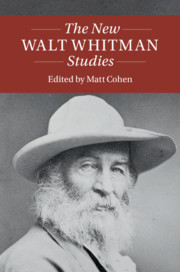Book contents
- The New Walt Whitman Studies
- Twenty-First-Century Critical Revisions
- The New Walt Whitman Studies
- Copyright page
- Contents
- Figures
- Contributors
- Acknowledgments
- Introduction
- Part I The New Life of the New Forms: Aesthetics, Disciplines, Politics
- Part II Wet Paper Between Us: New Reading Methods
- Part III A Kosmos: The Critical Imagination
- Chapter 10 Critique Is Not That Old, Composition Is Not That New: Sadakichi Hartmann’s Conversations with Walt Whitman
- Chapter 11 Reading Whitman in Disenchanted Times
- Chapter 12 “Permit to Speak at Every Hazard”: Whitman’s Grammar of Risk
- Chapter 13 Whitman Getting Old
- Index
Chapter 13 - Whitman Getting Old
from Part III - A Kosmos: The Critical Imagination
Published online by Cambridge University Press: 03 November 2019
- The New Walt Whitman Studies
- Twenty-First-Century Critical Revisions
- The New Walt Whitman Studies
- Copyright page
- Contents
- Figures
- Contributors
- Acknowledgments
- Introduction
- Part I The New Life of the New Forms: Aesthetics, Disciplines, Politics
- Part II Wet Paper Between Us: New Reading Methods
- Part III A Kosmos: The Critical Imagination
- Chapter 10 Critique Is Not That Old, Composition Is Not That New: Sadakichi Hartmann’s Conversations with Walt Whitman
- Chapter 11 Reading Whitman in Disenchanted Times
- Chapter 12 “Permit to Speak at Every Hazard”: Whitman’s Grammar of Risk
- Chapter 13 Whitman Getting Old
- Index
Summary
This chapter recasts the intellectual history of US sociology as a reception study of the poems of Walt Whitman, focusing on “Song of Myself.” Prominent early sociologists such as Robert Ezra Park and Daniel Brinton engaged Whitman under the banner of “social science.” They recirculated poetic extracts to illuminate the range of issues – from mass media and crowd psychology to race relations and urban studies – that became the foci of modern sociology. As the fledgling discipline probed for new conceptual models of social development in a modern, secular age, this professionalizing, reform-minded class of social scientists employed nineteenth-century verse to explicate twentieth-century social theory. More than most, Whitman’s poetry, which demanded empathy as well as observation, furnished the vocabulary for a compassionate, impartial, and distinctively American sociology.
- Type
- Chapter
- Information
- The New Walt Whitman Studies , pp. 232 - 247Publisher: Cambridge University PressPrint publication year: 2019

